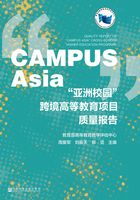
Preface
CAMPUS Asia, the abbreviation for the Collective Action of Mobility Program of University Students in Asia, is a top-down educational exchange initiative dominated by Chinese, Japanese and South Korean government based on Trilateral Summit Meeting in China, Japan and South Korea and the spirit of Trilateral Cooperation Vision 2020. To ensure the smooth implementation of“CAMPUS Asia”initiative, the three countries have jointly set up the Trilateral Committee for Promoting Exchange and Cooperation Among Universities(hereinafter referred to as the“Committee”), which consists of government authorities, universities, evaluation agencies and industry representatives. Quality assurance agencies of the three countries are responsible for quality control and assurance in implementing the project.
In 2012, student exchanges were officially initiated for the first 10 pilot programs of“CAMPUS Asia”initiative. In those pilot programs, program resources were made good use of and various forms of university exchange campaigns were organized, aiming to explore the patterns and systems suitable for cooperation and exchanges of universities in Asia. Also, exchange programs of different types and levels were developed based on the rich experience and good practices derived from pilot programs to gradually expand the program scale. To strengthen process monitoring of pilot programs, the Higher Education Evaluation Center of the Ministry of Education of the People's Republic of China(“HEEC”), entrusted by the Department of International Cooperationa and Exchanges of the the Ministry of Education, carried out the midterm evaluation on 10 pilot programs in 2014 and completed the 1st Quality Monitoring Report of CAMPUS Asia Pilot Programs. Just in the same year, the selection of good practices of“CAPUS Asia”pilot programs was initiated and the Collection of Good Practices of CAMPUS Asia Pilot Programs was compiled. Both reports were well recognized and reviewed by government authorities, expert members, university representatives and evaluation agencies of China, Japan and South Korea at the plenary meeting of the Trilateral Committee for Promoting Exchange and Cooperation Among Universities. Also, they were recognized by the Ministry of Education of China for publicity at the press conference of Trilateral Cooperation Secretariat(TCS)at the level of foreign affairs.
The year 2015 marked the final stage of“CAMPUS Asia”pilot programs. In order to conduct an overall inspection on the important cross-border higher education cooperation initiative and describe the advancement and teaching quality of these programs in a detailed and objective manner so as to provide a reference for the formal implementation of the initiative, from the years 2015 to 2016, HEEC, together with Japanese and Korean evaluation agencies, conducted a final quality evaluation of the“CAMPUS Asia”initiative, and adopted a joint model in the final evaluation. Quality assurance agencies from China, Japan and South Korea recommended highlevel experts of the three countries to form an expert team. Based on the joint evaluation criteria formulated by experts, the team made a joint material review and site sampling visit of 10 participating programs and formulated a final quality evaluation report. The cooperating accomplishments achieved by quality assurance agencies of the three countries were commended by Asia-Pacific Quality Network(APQN). Also, Higher Education Evaluation Center of the Ministry of Education(HEEC)was granted the“APQN Award of International Cooperation in QA”.
This report represents a complete summary of the pilot stage of“CAMPUS Asia”initiative based on the final evaluation. We try to describe the implementing quality and leading practices of“CAMPUS Asia”pilot programs in a detailed, typical and objective manner in the principle of characteristics, demonstration and consistency by fully respecting the differences and uniqueness of their cultures. It is hoped that this report would facilitate the overall quality improvement and sustainable development of“CAMPUS Asia”initiative and play a demonstrating role in the multilateral cooperation of cross-border education.
During the preparation of this report, we have received guidance and support from the Department of International Cooperation and Exchanges of the Ministry of Education of China and fully integrated valuable advice of experts. We also got support and cooperation from Chinese universities involved in these pilot programs. Therefore, we would like to express our sincerest gratitude to them all. Zhou Aijun was responsible for guidance on the preparation of this report;Liu Zhentian, Li Liqun was specifically in charge of report preparation; Zheng Mi was responsible for sorting, analysis and preparation of data; Zheng Mi and Wang Shuo conducted English translation and proofreading; Wang Wei and Fan Luqiang participated in the pre - and post-preparation of this report. Due to the limitation of our abilities and skills, if there is any defect in our report, we hope our peers and colleagues could give criticism and guidance so that we can make improvements in our future work.